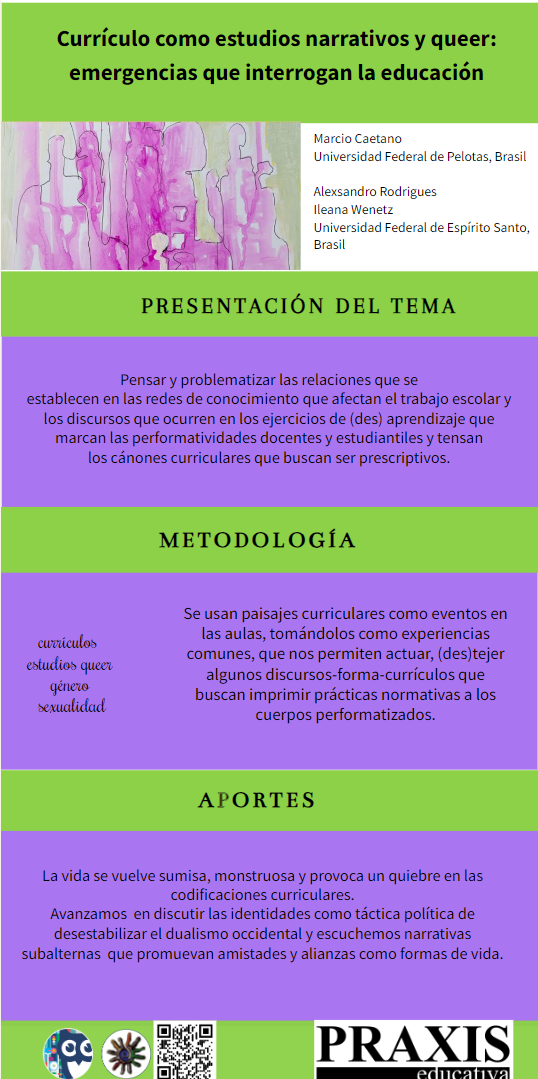Curricula as narratives and queer studies: emergences that question education
DOI:
https://doi.org/10.19137/praxiseducativa-2024-280211Keywords:
Resumes; Queer Studies; Genre; Sexuality.Abstract
This article presents as an opportunity to think and problematize the relationships that are established in the knowledge networks that affect the school practice and the discourses that take place in the (dis)learning exercises that mark the teaching and student performativities and tension the curricular canons that seek themselves as a prescription. Therefore, eager for dialogues with Poststructuralist Studies, with them we seek to use curricular landscapes as events in classrooms, taking them as common experiences, which allow us to act and (dis) weave some discourses-shape-curricula that seek to ingraft normative practices to the performatized bodies. In this exercise, inspired by Queer Studies, life becomes unsubmissive, monstrous and provocative of a breaking in curricular codifications.
Downloads
References
Bento, B. (2006). A reinvenção do corpo: sexualidade e gênero na experiência transexual. Garamond.
Britzman, D. (2001). Curiosidade, Sexualidade e Currículo. En. LOURO, Guacira Lopes (Ed.), O corpo
educado: pedagogias da sexualidade (pp. 83-112). Belo Horizonte: Autêntica, 2001.
Butler, J. (2015). Quadros de guerra: quando a vida é passível de luto? Civilização Brasileira.
Butler, J. (2018). Corpos em aliança e a política das ruas: notas para uma teoria performativa da
assembleia. Civilização Brasileira.
Butler, J. (2013). Problemas de Gênero: feminismo e subversão da identidade. Civilização Brasileira.
Caetano, M. (2016). Performatividades reguladas. heteronormatividade, narrativas biográficas e
educação. APPRIS.
Certeau, M. (1994). A invenção do cotidiano: artes de fazer. Vozes.
Collins, P. H. (2016). Aprendendo com a outsider within: a significação sociológica do pensamento
feminista negro. Revista Sociedade e Estado. Vol. 31 N.1, pp. 99-127.
da Silva, T. T. (2015). Documentos de identidade: uma introdução às teorias de currículo. Autêntica.
da Silva, T. T. (1996). Identidades terminais: as transformações na política da pedagogia e na pedagogia
da política. Vozes.
Foucault, M. (2006). Microfísica do poder. Paz e Terra.
Foucault, M. (2013). O corpo utópico, as heterotopias. n-1 edições.
Foucault, M. (2014). Ditos e escritos, volume IX: genealogia da ética, subjetividade e sexualidade.
Forense Universitária.
Hooks, B. (2015) Mulheres negras: moldando a teoria feminista. Revista Brasileira de Ciência Política,
nº16. pp. 193-210.
Laurets, T. (2019). Teoria queer, 20 anos depois: identidade, sexualidade e política. En: Hollanda, H. B.
(Ed.), Pensamento feminista: conceitos fundamentais (pp. 397-410). Bazar do tempo.
Miskolci, R. (2009). Teoria queer: um aprendizado pela diferença. Autêntica.
Piedade, V. (2017). Dororidade. Editora Nós.
Spargo, T. (2018). Foucault e teoria queer: seguido de Ágape e orientações pós-seculares. Autêntica.
Soares, M. da C. S. (2013). Pesquisas com os Cotidianos: devir-filosofia e devir-arte na ciência. Educação
& Realidade, 38(3). p. 731-745.
Weeks, J. (1998). Sexualidad. Paidós.

Published
Issue
Section
License
Copyright (c) 2024 Marcio Caetano, Alexsandro Rodrigues, Ileana Wenetz

This work is licensed under a Creative Commons Attribution-NonCommercial-ShareAlike 4.0 International License.
Copyright Notice
Editorial Committee Educational Praxis Magazine:
I hereby declare that I am the author of the article titled (article name), that it is original and my own and that it was not previously published in any other format or medium. I declare to know that the magazine will not charge me any type of fee under any circumstances, nor will I receive any type of monetary compensation If it were accepted for publication in Educational Praxis, I authorize the aforementioned magazine to publish it digitally and to advertise it on its social networks.
If the work is published, I adhere to the Creative Commons license called "Attribution - Non-Commercial Share Alike CC BY-NC-SA", through which it is allowed to copy, reproduce, distribute, publicly communicate the work and generate derivative works, as long as when the original author is cited and acknowledged. This license has been used since September 2018. In 2016 CC BY NC ND 4.0 was adhered to; and in the years 2017 and 2018 (January-August) CC BY NC 4.0.
This CC BY-NC-SA Share Alike license does not, however, permit commercial use of the work. As an author, the journal may establish additional agreements for the non-exclusive distribution of the version of the work published in the journal, it allows me to self-archive the published articles, in their post-print version, in institutional, thematic repositories, personal web pages or any other relevant use. with the recognition of having been first published in this journal.
Educational Praxis adheres to DORA (Declaration on Research Assessment) signed in San Francisco, California, on December 16, 2012, and to the Declaration of Mexico (Joint Declaration LATINDEX - REDALYC - CLACSO - IBICT).














_(1)2.png)


3.png)











_(2).png)






2.jpg)









